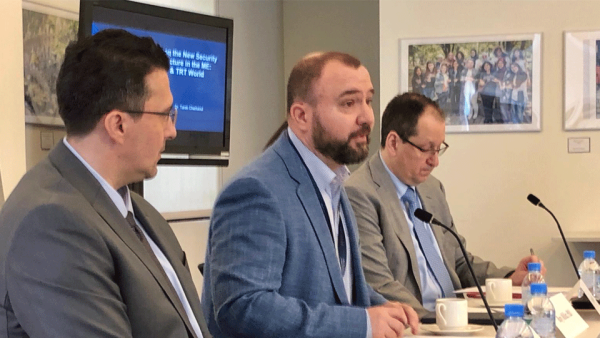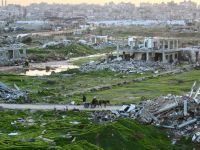Georgetown Hosts Workshop on Re-Imagining Regional Security in the Middle East

A recent full day workshop at Georgetown University in Qatar (GU-Q) titled “Re-imagining Regional Security in the Middle East” brought together leading academics and experts working in the fields of mass media, international relations, and security studies. The event was co-sponsored by the Gerda Henkel Foundation, and organized and moderated by GU-Q Professor of Government, Rory Miller.
Participating experts included the head of the Turkish Radio and Television Corporation (TRT) Research Center, Tarek Cherkaoui. Taking news coverage of major events on Al Jazeera English and TRT as case studies, he presented his research on the use of broadcast media to expand national influence, and as a key indicator for a nation's public diplomacy. Dividing the region into four axes, the media studies scholar compared and contrasted national strategies aimed at improving the government’s image and gaining public support for policies through leveraging public media platforms.
The event also featured Cinzia Bianco, a researcher on Middle East politics at the University of Exeter, whose presentation “The Hybridisation of Threat Perceptions and Regional Security,” addressed how perceptions affect policy decisions. She also focused on the differences between internal and external threats and the fact that external threats may impact other countries. She explored how these threats are often used by ruling regimes as a pretext to curb uprisings and revolutions, and gave examples of the specific security concerns and perceptions of GCC countries. The theme of how perception influences action was echoed by Imad Mansour from Qatar University whose talk covered “Taking Narratives seriously: Ideational Foundations of the Iran-Israel Rivalry.”
Several speakers touched directly on security in Qatar. Fahd Al Marri from Warwick University spoke on the role of sovereign wealth funds in responding to the blockade of Qatar, while Ismail Numan Telci from Sakarya University in Turkey talked about the changing Turkish-Qatari relations from cooperation to strategic alliance. Damilola Olawuyi from HBKU explored Qatar’s energy alliances in a new security environment.
Other guests such as Igor Matveev from MGIMO-University, who spoke on Russian-Syrian Economic Relations, and Sarah Cardaun from King’s College London who spoke about Informal Security Coalitions in the Middle East, also discussed features of the emerging security environment.
The workshop was attended by faculty and staff at GU-Q, other academics and researchers from Qatar Foundation, as well as members of the diplomatic and security community, who took part in the fruitful discussions on the workshop topics.
Background Information
Georgetown University in Qatar
Established in 1789 in Washington, DC, Georgetown University is one of the world’s leading academic and research institutions. Georgetown University in Qatar (GU-Q), founded in 2005 in partnership with Qatar Foundation, seeks to build upon the world-class reputation of the university through education, research, and service. Inspired by the university’s mission of promoting intellectual, ethical, and spiritual understanding, GU-Q aims to advance knowledge and provide students and the community with a holistic educational experience that produces global citizens committed to the service of humankind.
Located in Doha’s Education City, GU-Q offers the same internationally recognized Bachelor of Science in Foreign Service degree as Georgetown’s Capitol Campus in Washington, DC. This unique, interdisciplinary program prepares students to tackle the most important and pressing global issues by helping them develop critical thinking, analytic, and communication skills within an international context. GU-Q alumni work in leading local and international organizations across industries ranging from finance to energy, education, and media. The Qatar campus also serves as a residency and delivery location for the Executive Master’s in Emergency and Disaster Management along with the Executive Master’s in Leadership.






